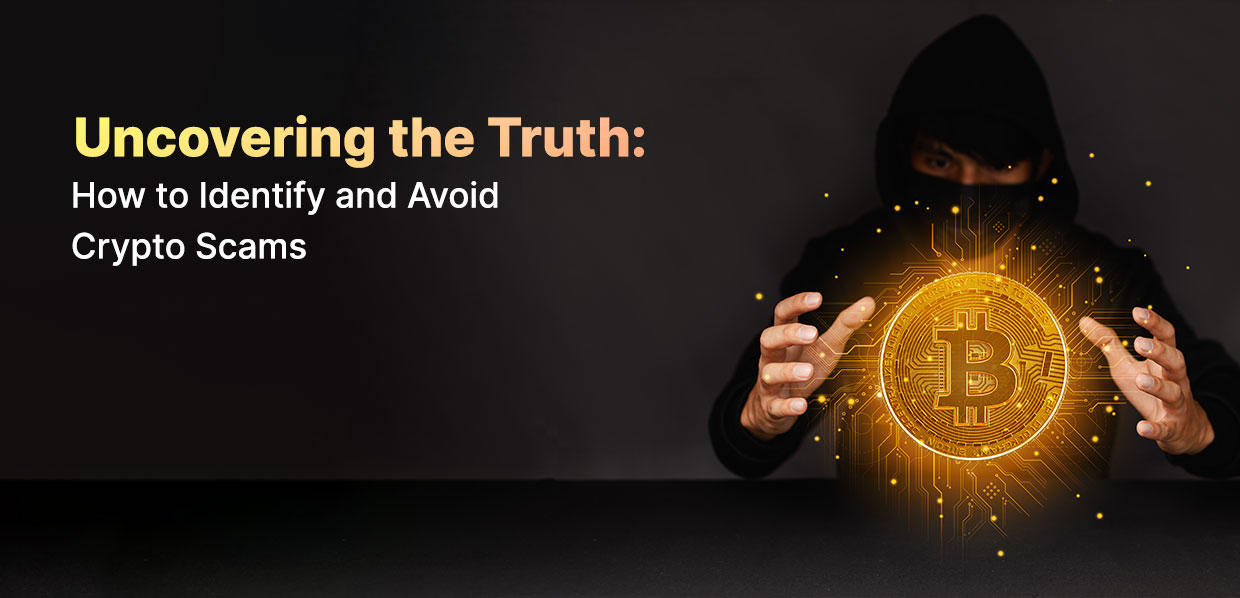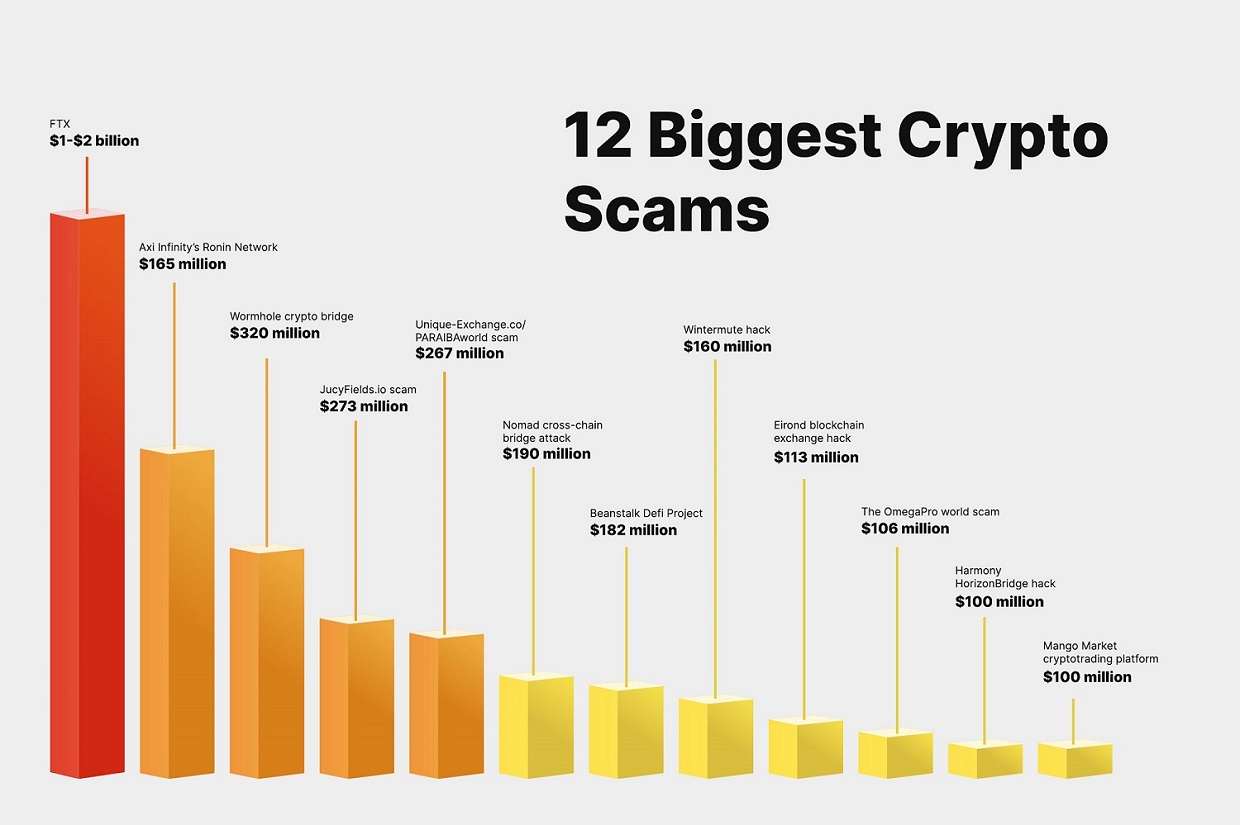SHARE THIS ARTICLE
How to secure yourself from FTX and other scams

In the era of digitalization and technology, the prevalence of scams and frauds has become increasingly common. Fraudulent activities such as FTX, where fraudsters use a combination of fake identities, deceptive emails, and other tactics, are on the rise. It is important to be aware of the risks of engaging in financial and trading activities online, and understand how to protect yourself from FTX and other scams.
This blog will provide an informative overview of the methods and techniques that can be used to ensure your safety when dealing with online transactions.
Explanation of FTX and other scams in the Cryptocurrency Industry
Cryptocurrency scams have become increasingly common, and the FTX exchange is just one example. FTX is a reputable crypto exchange that provides Crypto Exchange Services and offers a range of trading products and services, including Crypto Exchange Development. However, scammers have exploited FTX's name and reputation to trick users into giving them cryptocurrency or personal information. These scams can occur via fake social media accounts that offer fraudulent giveaways or impersonate FTX customer support to obtain users' private information, leading to stolen funds from the victim's crypto wallet.
Cryptocurrency scams come in many forms, including fake ICOs, phishing attacks, and Ponzi schemes. These fraudulent schemes can deceive investors and lead to significant financial losses. It's important to be aware of the red flags and common tactics used by scammers to protect yourself from these types of scams in the cryptocurrency industry.
Don't Fall for It: How to Identify Crypto Scams?
Scammers are constantly devising new ways to exploit cryptocurrency users, from traditional tactics like pig butchering to modern threats like phishing. To protect yourself from these types of scams, it's important to be aware of the common characteristics of fraudulent activity and the red flags to look out for.

One of the most common characteristics of scams is unrealistic returns. Many scams promise high returns with little or no risk, which should be a major red flag for investors. Additionally, scammers often use unlicensed or unregulated entities to try to lure in potential victims, which is why it's important to do your due diligence and verify the legitimacy of any investment opportunity before committing any funds.
Another red flag to watch out for is aggressive marketing tactics. Scammers often use high-pressure sales tactics to create a sense of urgency and convince investors to act quickly. They may also offer unsolicited offers or requests for personal information, such as login credentials or social security numbers. It's important to be wary of any unsolicited offers or requests for information and to only provide sensitive information to trusted and verified entities.
Here are few more common cryptocurrency scams to watch out for:
-
Fake ICOs (Initial Coin Offerings): Fake ICOs involve scammers creating a fake website or social media page to promote a new cryptocurrency. They convince people to invest in the new cryptocurrency by offering high returns on investment or promising to make them rich quickly. However, once people invest their money, the scammers disappear with the funds.
-
Phishing Scams: Phishing scams involve scammers impersonating legitimate cryptocurrency exchanges or wallets to trick people into giving away their login credentials. Once scammers have access to people's accounts, they can steal their cryptocurrency.
-
Ponzi schemes: Ponzi schemes involve scammers convincing people to invest in a fake cryptocurrency or investment opportunity that promises high returns. The scammers use the money from new investors to pay off earlier investors. Eventually, the scheme collapses, and many people lose their money.
-
Pump and dump scams: Pump and dump scams involve scammers promoting a cryptocurrency on social media or other channels to artificially inflate its value. Once the price has gone up, the scammers sell their holdings, causing the price to crash, and leaving other investors with losses.
-
Fake wallets and exchanges: Scammers create fake wallets and exchanges to trick people into giving away their cryptocurrency. Once people have deposited their funds into the fake wallet or exchange, the scammers disappear with the funds.
-
Malware and ransomware: Scammers can use malware and ransomware to gain access to people's cryptocurrency wallets or computers. They can steal cryptocurrency or demand payment in cryptocurrency to release control of a victim's computer.
-
Social media scams: Scammers use social media to promote fake giveaways, claiming that people can win cryptocurrency by sending a small amount of cryptocurrency to an address. Once people send the cryptocurrency, the scammers disappear with the funds.
Essential Best Practices for Avoiding Crypto Scams

To avoid falling victim to scams in the cryptocurrency industry, there are several best practices that you can follow. These include:
-
Research thoroughly: Before investing in any cryptocurrency or investment opportunity, do your due diligence and research the company or individual offering it. This can include checking their credentials, reading reviews and forums, and verifying their legitimacy.
-
Verify legitimacy: Always verify the legitimacy of a company or individual before investing any funds. This can include checking their regulatory status, their history and reputation, and their contact information.
-
Avoid unsolicited offers and requests for information: Be wary of any unsolicited offers or requests for personal information, such as login credentials or social security numbers. Scammers often use these tactics to obtain sensitive information and steal funds.
-
Use strong passwords: Use strong, unique passwords for all of your cryptocurrency accounts and change them regularly. This can help protect your funds from hacking attempts.
-
Secure personal information: Keep your personal information secure by avoiding public Wi-Fi networks and using encrypted communications. Additionally, only provide sensitive information to trusted and verified entities.
-
Use reputable exchanges and wallets: Use reputable cryptocurrency exchanges and wallets that are regulated and have a strong reputation in the industry. This can help reduce your risk of falling victim to scams or fraudulent activity.
-
Stay informed: Stay up-to-date with the latest news and trends in the cryptocurrency industry to stay informed of potential risks and threats.
Taking Action: Reporting Scams to Protect Yourself and Others
Reporting scams to the relevant authorities is an important step in protecting yourself and others from fraudulent activity in the cryptocurrency industry. If you suspect that you have been a victim of a scam, or if you have information about potential scams, there are several ways that you can report it.
One option is to report the scam to the Federal Trade Commission (FTC), which is responsible for investigating and prosecuting fraudulent activity. You can file a complaint with the FTC through their website, which will provide you with information on how to report the scam, as well as information on what to do next to protect your finances and personal information.
Another option is to report the scam to the Securities and Exchange Commission (SEC), which is responsible for regulating the securities industry in the United States. If you have invested in a cryptocurrency or other securities product that you suspect may be a scam, you can report it to the SEC using their online complaint form.
Reporting scams is important not only to protect yourself but also to help protect others from falling victim to fraudulent activity. Additionally, reporting scams can potentially help you recover lost funds, as authorities may be able to investigate and prosecute the individuals responsible for the scam.
Conclusion
By following the best practices outlined in this article, you can protect yourself from scams in the cryptocurrency industry. It's important to stay vigilant and avoid any investment opportunity that triggers red flags. Together, we can help reduce the impact of scams on the industry and promote a safer, more secure investment environment.
Post Author

Vivek is a passionate writer and technology enthusiast with expertise in blockchain development. As the lead writer for Codezeros, he aims to educate and inform readers about the potential of blockchain technology and simplify complex concepts to present them in an engaging manner for both technical and non-technical readers.




